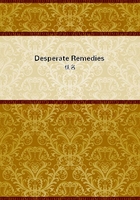
第60章
'Certainly, madam,' he said, slowly, like a man feeling his way in the dark. Manston was utterly at fault now. His previous experience of the effect of his form and features upon womankind en masse, had taught him to flatter himself that he could account by the same law of natural selection for the extraordinary interest Miss Aldclyffe had hitherto taken in him, as an unmarried man; an interest he did not at all object to, seeing that it kept him near Cytherea, and enabled him, a man of no wealth, to rule on the estate as if he were its lawful owner. Like Curius at his Sabine farm, he had counted it his glory not to possess gold himself, but to have power over her who did. But at this hint of the lady's wish to take his wife under her wing also, he was perplexed: could she have any sinister motive in doing so? But he did not allow himself to be troubled with these doubts, which only concerned his wife's happiness.
'She tells me,' continued Miss Aldclyffe, 'how utterly alone in the world she stands, and that is an additional reason why I should sympathize with her. Instead, then, of requesting the favour of your retirement from the post, and dismissing your interests altogether, I will retain you as my steward still, on condition that you bring home your wife, and live with her respectably, in short, as if you loved her; you understand. I WISH you to stay here if you grant that everything shall flow smoothly between yourself and her.'
The breast and shoulders of the steward rose, as if an expression of defiance was about to be poured forth; before it took form, he controlled himself and said, in his natural voice--'My part of the performance shall be carried out, madam.'
'And her anxiety to obtain a standing in the world ensures that hers will,' replied Miss Aldclyffe. 'That will be satisfactory, then.'
After a few additional remarks, she gently signified that she wished to put an end to the interview. The steward took the hint and retired.
He felt vexed and mortified; yet in walking homeward he was convinced that telling the whole truth as he had done, with the single exception of his love for Cytherea (which he tried to hide even from himself), had never served him in better stead than it had done that night.
Manston went to his desk and thought of Cytherea's beauty with the bitterest, wildest regret. After the lapse of a few minutes he calmed himself by a stoical effort, and wrote the subjoined letter to his wife:--'KNAPWATER, November 21, 1864.
'DEAR EUNICE,--I hope you reached London safely after your flighty visit to me.
'As I promised, I have thought over our conversation that night, and your wish that your coming here should be no longer delayed. After all, it was perfectly natural that you should have spoken unkindly as you did, ignorant as you were of the circumstances which bound me.
'So I have made arrangements to fetch you home at once. It is hardly worth while for you to attempt to bring with you any luggage you may have gathered about you (beyond mere clothing). Dispose of superfluous things at a broker's; your bringing them would only make a talk in this parish, and lead people to believe we had long been keeping house separately.
'Will next Monday suit you for coming? You have nothing to do that can occupy you for more than a day or two, as far as I can see, and the remainder of this week will afford ample time. I can be in London the night before, and we will come down together by the mid-day train--Your very affectionate husband, 'AENEAS MANSTON.
'Now, of course, I shall no longer write to you as Mrs. Rondley.'
The address on the envelope was--MRS. MANSTON, 41 CHARLES SQUARE, HOXTON, LONDON, N.
He took the letter to the house, and it being too late for the country post, sent one of the stablemen with it to Casterbridge, instead of troubling to go to Budmouth with it himself as heretofore. He had no longer any necessity to keep his condition a secret.
7. FROM THE TWENTY-SECOND TO THE TWENTY-SEVENTH OF NOVEMBER
But the next morning Manston found that he had been forgetful of another matter, in naming the following Monday to his wife for the journey.
The fact was this. A letter had just come, reminding him that he had left the whole of the succeeding week open for an important business engagement with a neighbouring land-agent, at that gentleman's residence thirteen miles off. The particular day he had suggested to his wife, had, in the interim, been appropriated by his correspondent. The meeting could not now be put off.
So he wrote again to his wife, stating that business, which could not be postponed, called him away from home on Monday, and would entirely prevent him coming all the way to fetch her on Sunday night as he had intended, but that he would meet her at the Carriford Road Station with a conveyance when she arrived there in the evening.
The next day came his wife's answer to his first letter, in which she said that she would be ready to be fetched at the time named.
Having already written his second letter, which was by that time in her hands, he made no further reply.
The week passed away. The steward had, in the meantime, let it become generally known in the village that he was a married man, and by a little judicious management, sound family reasons for his past secrecy upon the subject, which were floated as adjuncts to the story, were placidly received; they seemed so natural and justifiable to the unsophisticated minds of nine-tenths of his neighbours, that curiosity in the matter, beyond a strong curiosity to see the lady's face, was well-nigh extinguished.